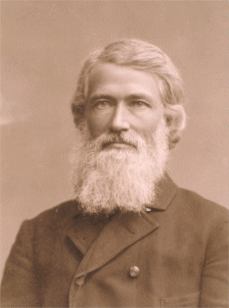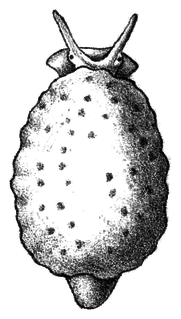
Severe acute respiratory syndrome (SARS) is a viral respiratory disease of zoonotic origin caused by severe acute respiratory syndrome coronavirus, the first identified strain of the SARS coronavirus species severe acute respiratory syndrome–related coronavirus (SARSr-CoV). The syndrome caused the 2002–2004 SARS outbreak. Around late 2017, Chinese scientists traced the virus through the intermediary of Asian palm civets to cave-dwelling horseshoe bats in Xiyang Yi Ethnic Township, Yunnan.

Johan Sebastian Cammermeyer Welhaven was a Norwegian author, poet, critic and art theorist. He has been considered "one of the greatest figures in Norwegian literature."

Horseshoe bats are bats in the family Rhinolophidae. In addition to the single living genus, Rhinolophus, which has about 106 species, the extinct genus Palaeonycteris has also been recognized. Horseshoe bats are closely related to the Old World leaf-nosed bats, family Hipposideridae, which have sometimes been included in Rhinolophidae. The horseshoe bats are divided into six subgenera and many species groups. The most recent common ancestor of all horseshoe bats lived 34–40 million years ago, though it is unclear where the geographic roots of the family are, and attempts to determine its biogeography have been indecisive. Their taxonomy is complex, as genetic evidence shows the likely existence of many cryptic species, as well as species recognized as distinct that may have little genetic divergence from previously recognized taxa. They are found in the Old World, mostly in tropical or subtropical areas, including Africa, Asia, Europe, and Oceania.

Michael Sars was a Norwegian theologian and biologist.

The Sunda pangolin, also known as the Malayan or Javan pangolin, is a species of pangolin.
SARS most commonly refers to severe acute respiratory syndrome, a viral respiratory disease identified in the early 2000s caused by SARS-CoV-1.

Carinaria is a genus of medium-sized floating sea snails, pelagic gastropod molluscs in the family Carinariidae.
Leuconidae is a family of marine hooded shrimp. The family was established by Georg Ossian Sars in his 1878 study of Mediterranean cumaceans.

Johan Ernst Welhaven Sars was a Norwegian professor, historian, author and editor. His main work was Udsigt over den norske Historie, four volumes issued from 1873 to 1891. He co-edited the magazines Nyt norsk Tidskrift from 1877 to 1878, and Nyt Tidsskrift from 1882 to 1887. He was politically active for the Liberal Party of Norway and among the party's most central theoreticians.

Bela is a genus of sea snails; marine gastropod mollusks in the family Mangeliidae.

Onchidiopsis glacialis is a species of small sea snail with a transparent internal shell, a marine gastropod mollusk in the family Velutinidae. Because the shell is mostly internal, the snail resembles a sea slug in general appearance.
The 2013 Tipperary Senior Hurling Championship was the 123rd staging of the Tipperary Senior Hurling Championship since its establishment in 1887. The championship began on 15 June 2013 and ended on 13 October 2013.

Terebellides is a genus of polychaete worms in the family Trichobranchidae.

Gonactinia is a monotypic genus of sea anemones, and G. prolifera is the only species in the genus. It is sometimes called the storey anemone and is found on either side of the northern Atlantic Ocean.

Trichobranchidae is a family of annelids in the order Terebellida. It consists of one subfamily, Trichobranchinae, to which all of its genera belong.
Corymorpha nutans is a hydroid in the family Corymorphidae.
Siphonodentalium is a genus of small tusk shells in the family Gadilidae.

Kinn is a municipality in Vestland county, Norway. It was established on 1 January 2020. It is in the traditional districts of Nordfjord and Sunnfjord. The municipality is the only non-contiguous municipality in Norway since the municipality of Bremanger lies in between the north and south parts of Kinn. The administrative centres of the municipality is the two cities of Florø and Måløy. Some villages in the municipality include Rognaldsvåg, Stavang, Grov, Norddalsfjord, Nyttingnes, Steinhovden, Brandsøy, Deknepollen, Holvika, Kvalheim, Langeneset, Raudeberg, Refvika, Silda, Tennebø, Vedvika, and Vågsvåg.

Severe acute respiratory syndrome coronavirus 2 (SARS‑CoV‑2) is the virus that causes COVID-19, the respiratory illness responsible for the COVID-19 pandemic. Also colloquially known simply as the coronavirus, it was previously referred to by its provisional name, 2019 novel coronavirus (2019-nCoV), and has also been called human coronavirus 2019. First identified in the city of Wuhan, China, the World Health Organization declared the outbreak a Public Health Emergency of International Concern on 30 January 2020, and a pandemic on 11 March 2020. SARS‑CoV‑2 is a positive-sense single-stranded RNA virus that is contagious in humans. As described by the US National Institutes of Health, it is the successor to SARS-CoV-1, the virus that caused the 2002–2004 SARS outbreak.

"Cluster 5", also referred to as ΔFVI-spike by the Danish State Serum Institute (SSI), is a variant of SARS-CoV-2, the virus that causes COVID-19, that is believed to be extinct. It was discovered in North Jutland, Denmark, and is believed to have been spread from minks to humans via mink farms. On 4 November 2020, it was announced that the mink population in Denmark would be culled to prevent the possible spread of this mutation and reduce the risk of new mutations happening. A lockdown and travel restrictions were introduced in seven municipalities of North Jutland to prevent the mutation from spreading, which could compromise national or international responses to the COVID-19 pandemic.














